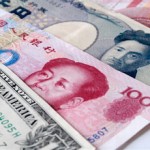Dollar Gains Fifth Day Versus Yen Before GDP as Aussie Weakens

The dollar rose for a fifth day against the yen before U.S. reports that analysts said will show economic growth was revised higher and durable goods orders increased.
A gauge of the greenback climbed to a five-year high after Standard & Poor’s raised its forecast for U.S. gross domestic product in 2015, saying lower oil prices may boost consumer spending. Australia’s dollar approached a four-year low as a six-month slide in commodity prices damped the nation’s growth outlook. Malaysia’s ringgit dropped for a third day on concern crude oil will extend declines, crimping the country’s export revenue and foreign reserves.
“As we get into the period where the Federal Reserve starts to actually increase interest rates, we’re going to see the dollar strengthen quite significantly against the other Group of Four currencies,” Kelvin Tay, a money manager at UBS Wealth Management in Singapore, said in an interview on Bloomberg Television. “The U.S. dollar is going to be quite a strong currency in 2015.”
The dollar gained 0.1 percent to 120.12 yen at 2:13 p.m. in Tokyo after rising to 120.18, the highest level since Dec. 9. The U.S. currency was little changed at $1.2232 per euro after appreciating to $1.2217 yesterday, the strongest since August 2012. The euro rose 0.1 percent to 146.93 yen.
The Bloomberg Dollar Spot Index (BCOM), which tracks the U.S. currency against 10 major counterparts, was little changed at 1,127.45 after rising to 1,128.50, the highest since March 2009. Japan’s markets are shut today for a national holiday.
‘Broadly Bullish’
“We remain broadly bullish on the dollar heading into year-end, and added a long dollar-yen recommendation Monday,” BNP Paribas analysts including Global Head of Foreign Exchange Strategy Steven Saywell in London, wrote in a note to clients. A long position is a bet an asset will rise.
The U.S. economy expanded 4.3 percent in the third quarter from a year earlier, up from a previous estimate of 3.9 percent, according to a Bloomberg News survey before today’s Commerce Department report. Durable goods orders grew 3 percent in November, after rising 0.3 percent the prior month, a separate survey showed.
S&P increased its forecast for GDP next year to 3.1 percent from 3 percent. The company kept its forecast for the Fed to raise borrowing costs in June, bringing the benchmark to as high as 1.25 percent by the end of 2015.
The dollar has surged 12 percent this year, the best performer of 10 developed-nation currencies tracked by Bloomberg Correlation-Weighted Indexes. The euro fell 1.4 percent and the yen declined 3 percent.
Aussie Declines
Australia’s dollar fell against 13 of its 16 major peers as the slide in raw materials damped the outlook for the nation’s exports. The Bloomberg Commodity Index dropped 1.5 percent yesterday and is down 15 percent this year.
“Commodity prices are also falling so much, pushing the nation’s terms of trade lower,” said Joseph Capurso, a currency strategist at Commonwealth Bank of Australia in Sydney. “That is going to offset some of the support of the rate hike later next year” by the central bank, he said.
The Aussie declined 0.2 percent to 81.18 U.S. cents after sliding to 81.07 on Dec. 17, the weakest since June 2010. It will fall to the low 70s in 2015, Capurso said.
The ringgit dropped toward the weakest in five years after Malaysia said its foreign reserves declined to $120.7 billion as of Dec. 15 from $125.7 billion at the end of November.
The currency fell 0.3 percent to 3.4985 per dollar after sliding to 3.5073 on Dec. 8, the least since September 2009.
Greek Vote
The euro was 0.1 percent from a two-year low as Greek Prime Minister Antonis Samaras seeks to rally support among lawmakers for his choice for president.
Greek lawmakers will hold the second of three possible votes today in Athens, with Samaras needing the support of 200 members in the country’s 300-seat chamber to confirm his nominee, Stavros Dimas, as head of state. The prime minister got the backing of 160 lawmakers in the first vote on Dec. 17.
“Another failed vote is likely to lead to a perception of re-emerging euro-zone sovereign risk among market participants, probably weighing on the euro in the near-term as market participants view developments through the lens of the 2010-2012 crisis,” the BNP analysts led by Saywell wrote.
South Korea’s won dropped for the first time in three days following yesterday’s decline in the yen. The two currencies tend to track each other as companies from the two countries compete in international markets.
The won fell 0.6 percent to 1,102.93 per dollar and declined 0.5 percent to 9.1802 yen.
Source: Bloomberg – Dollar Gains Fifth Day Versus Yen Before GDP as Aussie Weakens




























